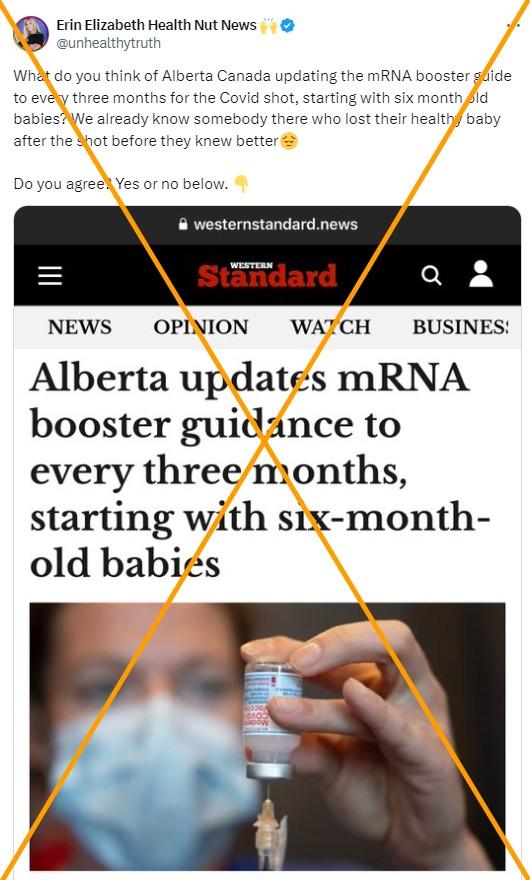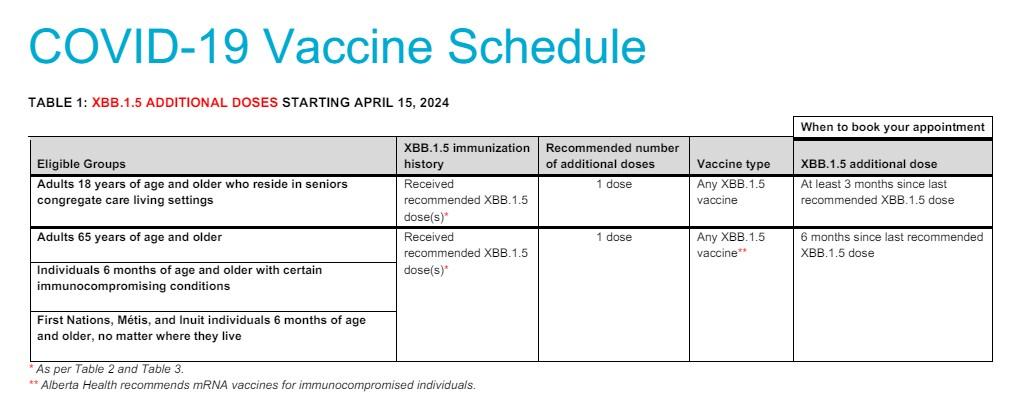
Updated Alberta Covid-19 vaccine advice misrepresented online
- This article is more than one year old.
- Published on April 23, 2024 at 20:58
- 3 min read
- By Gwen Roley, AFP Canada
"Yup, that's right now Alberta Health is recommending you get a 'booster' every 3 months," reads the caption of an April 16, 2024 Instagram video with more than 121,000 views.
The claim spread elsewhere on Instagram as well as on Threads, Facebook, TikTok and X, often referencing an article from the Western Standard, which published the headline, "Alberta updates mRNA booster guidance to every three months, starting with six-month-old babies" on April 15.
The claim was also picked up by The Counter Signal, which has previously spread misinformation, and Not The Bee, which is affiliated with the satirical Babylon Bee.


The posts come amid a flood of vaccine misinformation, including false claims about harmful effects, that has undermined confidence in public health efforts to fight Covid and other diseases.
The publications allude to an April 15 update from Alberta Health Services (AHS) regarding the recommendations for the XBB.1.5 mRNA Covid-19 vaccine (archived here), formulated to target a previously dominant Omicron subvariant of the virus.
The AHS webpage advises Albertans on how to make vaccine appointments and says: "Starting April 15, 2024, select groups of Albertans at high risk of severe outcomes from Covid-19 will be eligible for an additional dose of the XBB.1.5 Covid-19 vaccine (archived here)."
The site does not mention a recommendation for a new Covid-19 shot every three months for all Albertans.
"The only new development is that some Albertans deemed at high risk of severe outcomes are now eligible for an additional dose, should they choose," said Andrea Smith, a spokeswoman for the Alberta Health Ministry, which defines the provincial health guidelines.
Documents available on the AHS website (archived here) detail how immunocompromised and high-risk individuals over six months of age can now receive an additional XBB.1.5 shot half a year after completing the recommended immunization course, with a shortened three-month interval allowed for people residing in shared-living settings with seniors. The site offered no additional long-term guidance for the vaccines.

Jen Hodgson, the writer of the Western Standard story, told AFP in an April 18 email that after feedback on the article, its headline was revised to: "Alberta updates mRNA booster guidance for eligible groups to every three months, including immunocompromised six-month-old babies."
The original headline continues to spread via screenshots. Other outlets which published after the Western Standard have not updated their articles at the time of publication.
Additional doses
Different versions of Covid-19 vaccines derived from new variants of the virus have been deployed since the advent of the shots (archived here).
Canada's Immunization Guide developed by the National Advisory Committee on Immunization currently recommends one shot derived from the XBB.1.5 variant of the virus for anyone who has already received a primary vaccination series, at least six months after the last dose (archived here). A safety risk was not found for those on a shorter three month interval.
A January 2024 update advised an additional dose of this vaccine for high-risk individuals, with the same timing recommendations (archived here).
Dawn Bowdish, the Canada Research Chair of Aging and Immunity at McMaster University (archived here), said the coronavirus is approaching a pattern similar to seasonal influenza, where vaccines will be adapted to more closely target whatever variants are circulating.
"We don't talk about getting a booster every year, we talk about getting your seasonal flu shot," she said. "And so, with Covid-19, we have to adjust our thinking to think about that the same way."
However, she said the coronavirus rhythm is not yet as predictable as the flu, so receiving additional doses every six months is advisable for vulnerable people to obtain year-round protection.
Bowdish said the need for a shorter three-month interval for high-risk individuals is nuanced and dependent on the current epidemiological situation, but noted there are fewer new variants emerging now than at the height of the pandemic.
Studies have estimated that Covid-19 vaccines saved millions of lives (archived here and here) and physicians have continually told AFP the shots are safe and effective. The jabs' ability to prevent severe illness and death was found to outweigh the risks of possible side effects (archived here).
Read more of AFP's reporting on misinformation in Canada here.
Copyright © AFP 2017-2026. Any commercial use of this content requires a subscription. Click here to find out more.
Is there content that you would like AFP to fact-check? Get in touch.
Contact us




